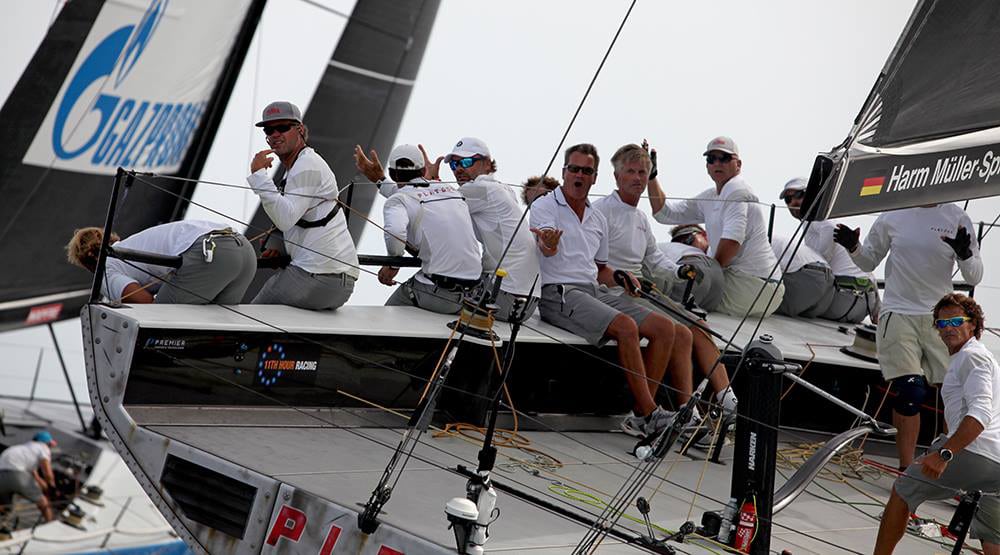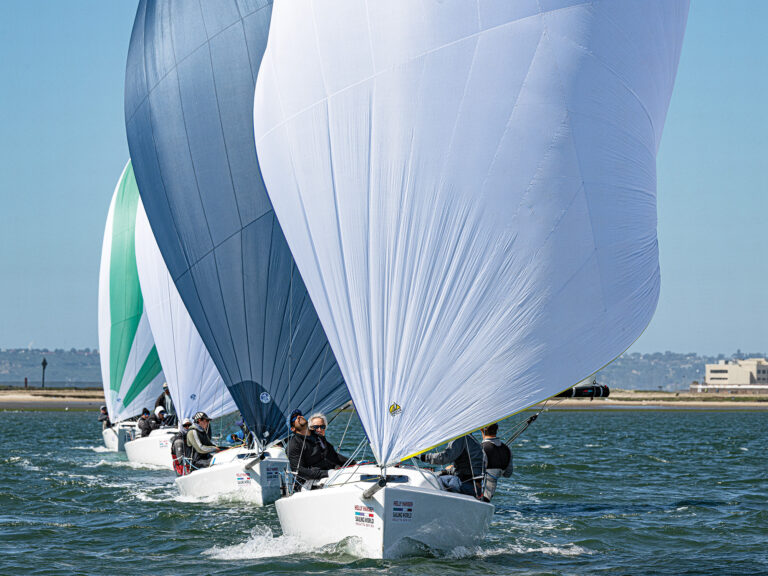
I’m coming off a March racing streak of two midwinters and another great regatta in between, all in Florida. The weather was colder than usual, but the friendships were as warm as ever and the racing was great. But I had the same distressing conversation over and over again:
Other guy: Today this boat fouled us and they didn’t do their circles.
Me: Did you hail, “Protest”?
OG: No.
Me: Why not?
OG: I felt they should have done their circles without me having to force them to, and I didn’t want to make a big deal out of it.It’s our duty as stewards of the sport to uphold the rules. Should we have to tell folks to do their turns? No. But, these days, we do. In the classes in which I compete, there seems to be a regrettable new standard: “If nobody saw it, it didn’t happen.” And worse, “If nobody forces me to do circles, then I don’t have to.”
In sailing, you can get away with all sorts of rules infractions. But are you really getting away with it? I take to heart the adage that winning without the respect of your competition isn’t winning. At the end of a regatta, what do we remember? Fun times, maybe a couple of good races, and, unfortunately, instances of poor sportsmanship. Looking back at all the races I’ve sailed over the years, I remember a couple of victories, a couple of times I did something I shouldn’t have, great victories by my friends, the parties and bar adventures, and of course the times I got fouled horribly and the bad guy got away with it.
We can’t ignore the negative impact rule-flaunting has on our sport, especially at the amateur level. When sailors sit down to figure out where they want to spend their ever-shrinking recreation budgets, many factors come into play. We consider the costs, but we also consider less tangible factors, like the type of people with whom we’re spending our precious free time. In many cases, the decision of whether to keep sailing comes down to a gut feeling that we later justify with logical facts. It’s at these times, I think, that poor sportsmanship causes us to lose on-the-fence sailors.
I have a typical on-the-fence sailor in mind. We’ll call him Joe. He has two kids and a wife, and he brings his family to the parties. Occasionally, Joe finds his way into the top third, but he normally finishes in the middle of the pack. He has a decently successful career and really enjoys sailing. He wasn’t raised in the sport, but sees it as a fun pursuit and wants to get his kids involved. At big events, he doesn’t get the invite to go out to dinner with the sailmakers and the hotshots, but he’s cool with that. He hangs out with his fellow fleet members and has a great time. Joe is one of our on-the-fence sailors. He’s not planning on quitting this year or next, but he also doesn’t have the family legacy to keep him around. We’ve all seen guys like Joe slowly disappear from our fleets, especially in the last few years.
Joe doesn’t leave because of a single-point failure; he leaves for many reasons, one of which, I think, is the “a-hole factor.” More and more, when Joe is racing, people break the rules and nobody says anything. The second part is critical. Guys like Joe do their best to play by the rules, but they feel too new to the sport to speak up when others run afoul. The more Joe gets fouled by sailors who refuse to do their turns—and in some cases take podium finishes because of their behavior—the more he sours on the sport. Poor sportsmanship begins to influence Joe’s decision whether he knows it or not. It’s like biting down on a grain of sand in a fish taco. If it happens enough times, you’re going to steer clear of fish tacos, even if you’ve forgotten about the sand.
It’s up to the more established racers to enforce the rules, all the way to the room if need be. It’s easy to forget how fragile even the largest classes really are. Often, the efforts of a handful of volunteers keep an entire class going strong for decades. When these people leave, without anyone to pick up the slack, classes fade. A single jerk can have the same effect. In a husband and wife class, it only takes a few instances of “I don’t want to go to the party because so and so might be there,” before nobody shows up at the parties. The sport of sailing is in a precarious position. Do your turns, or we lose Joe. If that happens, we’re all in trouble.
Rulebook Snapshot: Rule 61.1 a
A boat intending to protest shall inform the other boat at the first reasonable opportunity. When her protest concerns an incident in the racing area that she is involved in or sees, she shall hail “Protest” and conspicuously display a red flag at the first reasonable opportunity for each. She shall display the flag until she is no longer racing. However,
- if the other boat is beyond hailing distance, the protesting boat need not hail but she shall inform the other boat at the first reasonable opportunity;
- if the hull length of the protesting boat is less than 6 metres, she need not display a red flag;
- if the incident results in damage or injury that is obvious to the boats involved and one of them intends to protest, the requirements of this rule do not apply to her, but she shall attempt to inform the other boat within the time limit of rule 61.3.









